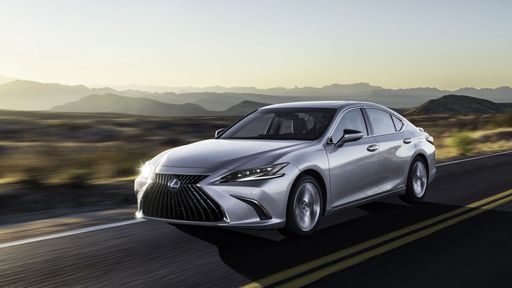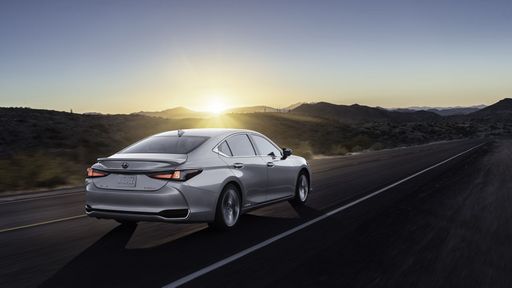Lexus ES vs Toyota Yaris – Which car suits you better?
Two cars, one duel: Lexus ES meets Toyota Yaris.
Which one wins in performance, efficiency and value for money? Find out now!
Costs and Efficiency:
When it comes to price and running costs, the biggest differences usually appear. This is often where you see which car fits your budget better in the long run.
Toyota Yaris has a significantly advantage in terms of price – it starts at 21900 £, while the Lexus ES costs 46600 £. That’s a price difference of around 24728 £.
Fuel consumption also shows a difference: Toyota Yaris manages with 3.80 L and is therefore evident more efficient than the Lexus ES with 5.10 L. The difference is about 1.30 L per 100 km.
Engine and Performance:
Power, torque and acceleration say a lot about how a car feels on the road. This is where you see which model delivers more driving dynamics.
When it comes to engine power, the Toyota Yaris has a clearly perceptible edge – offering 280 HP compared to 218 HP. That’s roughly 62 HP more horsepower.
In acceleration from 0 to 100 km/h, the Toyota Yaris is convincingly quicker – completing the sprint in 5.50 s, while the Lexus ES takes 8.90 s. That’s about 3.40 s faster.
In terms of top speed, the Toyota Yaris performs evident better – reaching 230 km/h, while the Lexus ES tops out at 180 km/h. The difference is around 50 km/h.
Space and Everyday Use:
Cabin size, boot volume and payload all play a role in everyday practicality. Here, comfort and flexibility make the difference.
Both vehicles offer seating for 5 people.
In curb weight, Toyota Yaris is clearly lighter – 1090 kg compared to 1680 kg. The difference is around 590 kg.
In terms of boot space, the Lexus ES offers evident more room – 454 L compared to 286 L. That’s a difference of about 168 L.
When it comes to payload, Toyota Yaris somewhat takes the win – 525 kg compared to 470 kg. That’s a difference of about 55 kg.
Who comes out on top?
Overall, the Toyota Yaris shows itself to be outperforms in nearly all aspects and secures the title of DriveDuel Champion.
It convinces with the more balanced overall package and proves to be the more versatile choice for everyday use.
 @ Toyota Motor Corporation
@ Toyota Motor Corporation
Toyota Yaris
Lexus ES
The Lexus ES represents a blend of luxury and comfort, offering a smooth driving experience that is characteristic of the brand. With its elegant design and meticulously crafted interior, it provides a serene environment for both driver and passengers. The inclusion of advanced safety features and cutting-edge technology enhances its appeal, ensuring that every journey is not only enjoyable but also secure.
details @ Lexus / Toyota Motor Corporation
@ Lexus / Toyota Motor Corporation
 @ Lexus / Toyota Motor Corporation
@ Lexus / Toyota Motor Corporation
 @ Lexus / Toyota Motor Corporation
@ Lexus / Toyota Motor Corporation
Toyota Yaris
The Toyota Yaris is a sprightly city hatch that packs clever packaging, surprising comfort and fuel-sipping manners into a neat, easy-to-park package. It rewards sensible buyers with low running costs, friendly ergonomics and a forgiving drive, delivered with Japanese reliability and just enough personality to make errands feel a little less ordinary.
details @ Toyota Motor Corporation
@ Toyota Motor Corporation
 @ Toyota Motor Corporation
@ Toyota Motor Corporation
 @ Lexus / Toyota Motor Corporation
@ Lexus / Toyota Motor Corporation
|
 @ Toyota Motor Corporation
@ Toyota Motor Corporation
|
|
|
|
Costs and Consumption |
|
|---|---|
|
Price
46600 - 59300 £
|
Price
21900 - 46700 £
|
|
Consumption L/100km
5.10 L
|
Consumption L/100km
3.8 - 9.5 L
|
|
Consumption kWh/100km
-
|
Consumption kWh/100km
-
|
|
Electric Range
-
|
Electric Range
-
|
|
Battery Capacity
-
|
Battery Capacity
-
|
|
co2
115 g/km
|
co2
87 - 215 g/km
|
|
Fuel tank capacity
50 L
|
Fuel tank capacity
36 - 50 L
|
Dimensions and Body |
|
|---|---|
|
Body Type
Sedan
|
Body Type
Hatchback
|
|
Seats
5
|
Seats
4 - 5
|
|
Doors
4
|
Doors
3 - 5
|
|
Curb weight
1680 kg
|
Curb weight
1090 - 1356 kg
|
|
Trunk capacity
454 L
|
Trunk capacity
141 - 286 L
|
|
Length
4975 mm
|
Length
3940 - 3995 mm
|
|
Width
1865 mm
|
Width
1745 - 1805 mm
|
|
Height
1445 mm
|
Height
1455 - 1500 mm
|
|
Max trunk capacity
-
|
Max trunk capacity
935 L
|
|
Payload
470 kg
|
Payload
289 - 525 kg
|
Engine and Performance |
|
|---|---|
|
Engine Type
Full Hybrid
|
Engine Type
Full Hybrid, Petrol
|
|
Transmission
Automatic
|
Transmission
Automatic, Manuel
|
|
Transmission Detail
CVT
|
Transmission Detail
CVT, Manual Gearbox, Automatic Gearbox
|
|
Drive Type
Front-Wheel Drive
|
Drive Type
Front-Wheel Drive, All-Wheel Drive
|
|
Power HP
218 HP
|
Power HP
116 - 280 HP
|
|
Acceleration 0-100km/h
8.90 s
|
Acceleration 0-100km/h
5.5 - 9.7 s
|
|
Max Speed
180 km/h
|
Max Speed
175 - 230 km/h
|
|
Torque
-
|
Torque
390 Nm
|
|
Number of Cylinders
4
|
Number of Cylinders
3
|
|
Power kW
160 kW
|
Power kW
85 - 206 kW
|
|
Engine capacity
2487 cm3
|
Engine capacity
1490 - 1618 cm3
|
General |
|
|---|---|
|
Model Year
2024
|
Model Year
2024 - 2025
|
|
CO2 Efficiency Class
C
|
CO2 Efficiency Class
B, G
|
|
Brand
Lexus
|
Brand
Toyota
|
Is the Lexus ES offered with different drivetrains?
The Lexus ES is offered with Front-Wheel Drive.
The prices and data displayed are estimates based on German list prices and may vary by country. This information is not legally binding.
